FARMS 2026 CATALOG
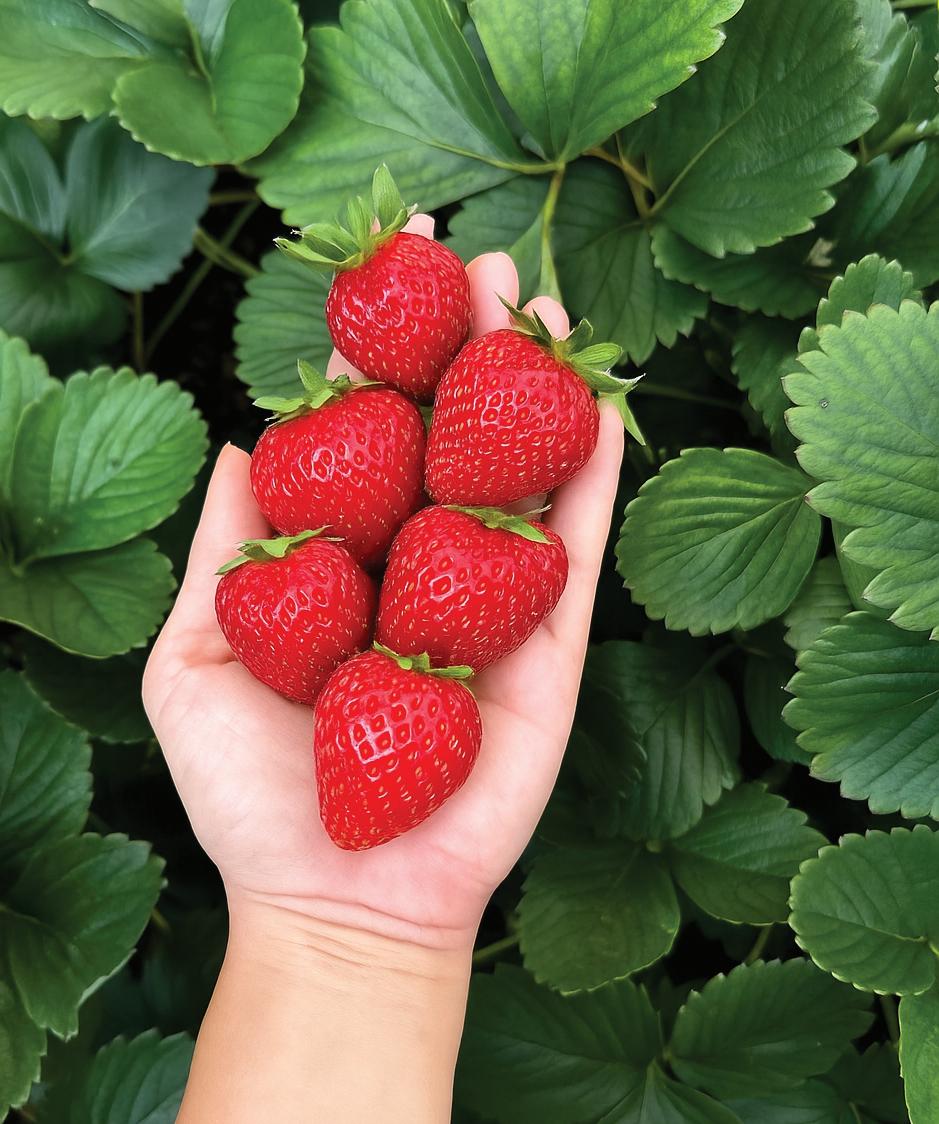
STRAWBERRY PLANTS
bare-root, tray, & plug plants
RASPBERRY PLANTS
bare-root, tray, & plug plants, & long canes
BLACKBERRY PLANTS
plug plants & long canes
BLUEBERRY PLANTS
1L pots AND MORE!


bare-root, tray, & plug plants
bare-root, tray, & plug plants, & long canes
plug plants & long canes
BLUEBERRY PLANTS
1L pots AND MORE!
A
new season. A new crop. A new opportunity.
As we look ahead to 2026 and beyond, one thing remains clear: farmers and growers are the backbone of our food system—not just in North America, but across the globe. With a growing population and increasing demand for fresh fruit, your role in feeding the world has never been more vital.
At Nourse Farms, we understand the pressures you face—unpredictable weather, disease challenges, rising costs, and shifting markets. That’s why we’re committed to providing more than high-quality plants. We’re here to be a resource, a partner, and an advocate for your success.
This year, we’re proud to introduce two new initiatives designed to support you in meaningful ways. First, the Jim Walsh Grower Education Scholarship will be established in 2026 in memory of our longtime colleague who passed away in 2025. Second, we’re launching a free Grower Lunch & Learn Webinar Series, offering practical, expert-led sessions live during lunchtime hours and
recordings on demand to fit into your busy schedule. Learn more about the webinars on the back cover of this catalog. Whether you’re a longtime commercial producer or just starting out, our goal through these programs is to ensure you have access to the tools and information you need to thrive.
Your success fuels our mission. Thank you for your continued trust in Nourse Farms. We’re honored to support your work and look forward to growing together in the year ahead.
Let’s keep growing, together.






For over 90 years, Nourse Farms has been a leader in producing the industry’s highestquality berry and small fruit plants. Our uncompromising standards result in virus-tested, pathogen-screened plants that perform with predictability, yield, and profit.
Our plants are virus-tested, pathogen-screened, and held to stringent health standards.
Uniform plants ensure confident planning every time.
We reject anything that doesn’t meet our standards.
ZERO COMPROMISE
Vigorous growth, consistent performance, better returns.
Our cutting-edge, state-of-the-art production facilities are built specifically for biosecurity, precision propagation, and genetic preservation.
We leverage rigorous diagnostics and testing unmatched in the industry.
We uphold strict sanitation protocols at every propagation and production stage.
Every Nourse Farms plant can be traced back to clean, healthy mother stock, supported by documentation and certification.
We invest in advanced genetics and breeding partnerships.

A company’s values are more than words—they guide every decision, product, and customer interaction. At Nourse Farms, our commitment to quality, responsibility, and reliability influences everything we do—from how we grow our plants to how we serve our customers. Growers turn to Nourse Farms for exceptional plants and dependable support they can feel good about—because integrity is at the heart of everything we do.

Our success is built on exceptional employees and superior products. We are committed to excellence in everything we do.
We make thoughtful, responsible decisions that benefit our customers, employees, products, and organization—ensuring long-term success.
Rooted in a strong foundation of trust and expertise, we continue to deliver dependable solutions for today and tomorrow.
Our biosecurity standards are among the strictest in the industry.
Our facilities are precision-engineered production environments.
We partner with top breeders to bring customers the best genetics.
Our data-driven processes ensure consistency from year to year.
We stand shoulder-to-shoulder with growers as partners.
We back every plant we ship.
At Nourse Farms, we take our role seriously as stewards of the land. The health of our soil, crops, and communities all depend on how we manage natural resources—especially water.
Although nearly 70% of the world’s accessible freshwater is used by agriculture, less than 1% of Earth’s total water is actually available for human use. That’s why we’re committed to sustainable water practices, including harvesting and reusing rainwater to reduce strain on municipal supplies and protect this vital resource for future generations.
An inch of rain can yield 30,000 gallons of water.
Unlike treated city water, rainwater has a pH that is optimal for plant growth. At our headquarters in Whately, MA, our greenhouses have gutters installed at the roof’s edge that funnel rainwater into a silo located behind the greenhouses. In our new construction, we’ve manufactured a 5-million-gallon rainwater retention pond. At our operation in Mills River, NC, we utilize a 6.5-million-gallon rainwater retention pond. We also operate advanced irrigation technology, such as watering booms, to irrigate our crops more consistently and efficiently, ensuring water reaches where it’s needed most—in the plant.
With the continued occurrence of irregular weather phenomena, water cycles may become disrupted, shifting the seasonality of water availability. These types of disruptions may result in droughts and floods, or wetter springs and drier summers. Our retention ponds allow us to use our collected water yearround.
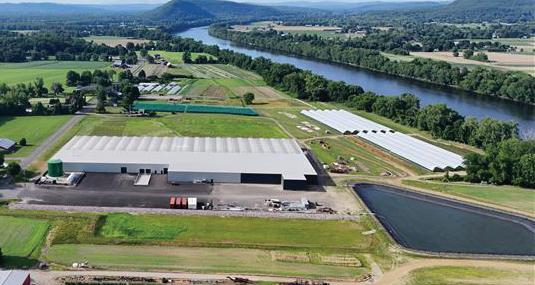
Harvesting rainwater helps mitigate water scarcity by reducing the strain on our local municipal supply, as well as lowering our carbon footprint by eliminating the energy needed for chemical treatment of the city water supply.
New to this year’s catalog are variety attribute sliding scales for strawberry, raspberry, blackberry, and blueberry varieties. Please note that the information reflected on these scales is based on Nourse Farms’ experience and knowledge. Exact results can vary by region, soil, management, and planting system—so these rankings reflect general performance, not a guarantee for every grower.
High tunnels are plastic, polyethylene, or fabric-covered hoop structures that allow farmers to control growing conditions, optimize plant health, and increase yields.
High tunnels create a microclimate that helps regulate temperature and humidity, thereby fostering a favorable environment for plant growth. High tunnels protect plants from harsh elements, such as frost and strong winds. With trends of wetter seasons and more intense rain events, high tunnels provide crop protection from such occurrences. Due to the exclusion of rainfall, disease prevalence from fungal pathogens like Botrytis cinerea is lower in raspberries grown in high tunnels compared to those grown in open fields. Additionally, high tunnels lessen stress from birds that may damage plants.
Since incorporating high tunnels into our raspberry production, we’ve extended our growing and marketing seasons. High tunnels enable us to plant earlier in the spring and harvest later into the fall, resulting in a market advantage. Not only are our berries reaching markets earlier, but our crop yields and overall crop quality have also significantly improved.
If you’re considering high tunnels for your operation, start by evaluating your sun exposure, site drainage, and wind patterns. Research tunnel styles and sizes that best suit your crop and climate. Talk to other growers who have experience with high tunnel production, and consult with extension specialists or suppliers to guide your setup. Starting with a small section can help you learn and adapt before expanding. With the right planning, high tunnels can be a game-changer for crop quality, yield, and season
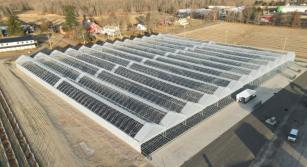
It might surprise some to learn that almost 10% of Nourse Farms customers are located in Pennsylvania, but it doesn’t surprise us. With its rich soils and favorable climate, the Keystone State is a natural fit for small fruit production.
Still, 2025 has brought plenty of challenges. The Pennsylvania Department of Environmental Protection reports the state is growing warmer and wetter. Temperatures have risen 1.8°F over the past century and are projected to climb nearly 6°F more by 2050. These shifts are already affecting growers through increased rainfall, heat stress, and unpredictable springs.
We recently caught up with two longtime customers— David Glick of Glick’s Greenhouse and Denise Bosworth of Rohrbach’s Farm—to hear how they’re adapting.
At Glick’s Greenhouse in the Oley Valley, changing USDA zones (from 6b to 7a) and earlier spring temperatures are shifting customer behavior. David Glick now sees peak traffic in March, weeks earlier than usual. He attributes this to both inexperienced gardeners and real climate changes.
Growers in his area are also rethinking infrastructure to manage heat and flooding.
In Catawissa, Rohrbach’s Farm faced an early strawberry bloom followed by heavy rain that wiped out much of the crop. Muddy fields delayed other plantings by weeks. Still, Denise Bosworth remains optimistic. Weather variability has reinforced her commitment to crop diversity and farmer-to-farmer learning. “Every conversation is a chance to learn something valuable,” she says.
At Nourse Farms, we believe that the strength of our community lies in shared knowledge. Listening, learning, and growing together are what moves this industry forward. As weather patterns shift, the experiences of peers like Denise, David, and growers across Pennsylvania offers real-world insight that can spark new ideas and smarter decisions. In an era of uncertainty, a connected farm community is more essential than ever. We’re here to grow with you—every step of the way.

• FAX 413-665-7888
• (877) NFBERRY (632-3779)
• info@noursefarms.com
ORDER NOW: NourseFarms.com
“It starts with our virus-indexed tissue culture mother plants, which has been a hallmark of our organization for decades,” said John Place, Nourse Farms CEO. “We have been working nonstop to expand our propagation systems to shield our plants from weather-related stress and reduce disease pressures. Our stringent quality control processes are designed to ensure our plants are in the best position to meet the highest standards of cleanliness and health. Our advanced systems promote superior root development, increased airflow around the plants, and stronger, healthier plants that are ready to thrive once they reach our customers.”
Nourse Farms hears the concerns of our customers every day. Strawberry production faces many challenges. “With unpredictable weather patterns and emerging disease pressures, we recognize the need to control our entire propagation process,” said Place. “While there’s no cure-all to eliminate all of the risks that we face as an industry, our integrated approach means we’re not just reacting to challenges; we’re leading the way in overcoming them, ensuring that our customers receive the highest-quality plants that are ready to get to work in their fields.”
This holistic approach enables Nourse Farms to respond swiftly to industry challenges, innovate continuously, and deliver exceptional quality plants that meet the evolving needs of growers.

If you are a grower interested in discovering how strawberry plug and tray plants can elevate your production, Nourse Farms is here for you! Strawberry plug plants are ideal for field production, while strawberry tray plants are optimal for substrate production. Our innovative growing techniques are designed to optimize plant health, improve yields, and extend the growing season, helping your business thrive. Whether you’re expanding your acreage, transitioning to new varieties, or looking for sustainable growing solutions, our team is ready to collaborate with you every step of the way.
This year’s catalog includes tray and plug plant varieties. Look for varieties marked with TP for tray plants and PP for plug plants.
Contact us at info@noursefarms.com or 1-877-NFBERRY (632-3779) to learn how we can tailor a program to meet your needs and grow your business together.

Target: 6.5–6.8, Acceptable: 6.0–6.8 SPACING
12–18” in the row, 3–4’ between rows
June-bearing strawberry plants bear fruit one year after planting.
Day-neutral/everbearing strawberry plants begin bearing fruit about 12–14 weeks after planting, depending on conditions.
Plant as soon as possible in the spring, after the soil has warmed to 50ºF.
Planting at the correct depth is very important. Plant with the middle of the crown level with the top of the soil and roots straight down.
Do not mulch with materials like decayed/wet leaves or grass clippings. We recommend approximately 4” of clean straw or salt marsh hay after the plants have gone dormant.
Do not renovate day-neutral/ everbearing strawberries, or Junebearing in the planting year.




Bare-root strawberry varieties pictured smallest fruit to largest.
Important Note: The photographs below feature actual images of the specified strawberry varieties; however, they are not shown to scale. The size comparisons are approximate and intended to illustrate the diversity of strawberry sizes and shapes.





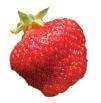
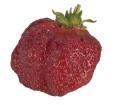




Individual strawberries may vary and are not guaranteed to match the exact size or shape depicted in the image. Exact fruit size can vary by region, soil, management, and planting system—so this ranking reflects general performance, not a guarantee for every grower.





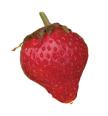


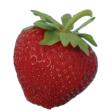


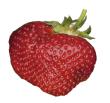
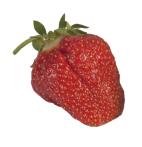

U.S. Plant Patent #18,340 (K96-5 x Evangeline) Early Season

Our #1 early-season variety for commercial growers. The plant is vigorous and runners well. Freshtasting wedge-shaped to conic berries have firm, bright-colored flesh and hold fruit size through the picking season. This variety can be susceptible to frost damage due to early flowering.
SEE PRICE LIST ON PAGE 17.
*Price includes royalty or usage fee. Patent laws or license contracts prohibit propagation of the variety for resale or trade.
U.S. Plant Patent #19,763 (NCH87-22 x Earliglow) | Early Season

An Earliglow hybrid, the plant is vigorous and produces large, firm, glossy fruit with excellent flavor. Offers good tolerance to leaf diseases and red stele, and is moderately winter hardy. Shows excellent performance on heavy soils.
[(Micmac x Raritan) x Earliglow] | Early Season

A first-rate choice for U-Pick markets. The plant is vigorous with abundant runners that produce high-quality, medium-large fruit with a mild, sweet flavor. Also very winter hardy and has shown some resistance to red stele and foliar diseases.
(Fairland x Midland) x (Redglow x Surecrop) Early Season

Known for heirloom quality and delightful flavor, these glossyskinned berries are medium in size and firmness. The plants are vigorous, producing ample runners. Offers good resistance to red stele and intermediate resistance to Verticillium wilt.
U.S. Plant Patent #28,048 (Honeoye x E1991-023) | Early Mid-Season

Highly recommended for U-pick and fresh market operations. Plant is vigorous with a dark green color. Sweet-flavored, uniform strawberries do not require any special nutrients or soil type, making them easy to manage. Released by Fresh Forward and bred by Burt Meulenbroek.
(Vibrant x Holiday) | Early Mid-Season

Recommended for beginners and organic growers. Known for its winter hardiness, high productivity, and attractive, firm, large berries, Honeoye combines sought-after qualities in one plant. The berries are easy to pick, and the plants produce high yields throughout a long fruiting season.
Plasticulture Choice
Disease Resistant
Very Winter Hardy
(Cavendish x Honeoye) | Early Mid-Season

A popular choice for roadside market and commercial sales, as well as organic growers. Plants have very reliable vigor and disease resistance. Berries feature good size, appearance, and flavor. Rated high by customers, especially in northern locations.
(Annapolis x Glooscap) | Early Mid-Season

Loved for its excellent flavor and overall quality. A cross between Annapolis and Glooscap, both known for their winter hardiness and attractive, large fruit. Produces high yields that ripen over a long growing season. Highly resistant to red stele. Can ripen unevenly in temps over 85ºF.
U-Pick Favorite
Roadside/Fresh Market
Excellent Yields

Freeze/Jam/Bake
Consistent Performer
Container Grower
Double Crop Choice Ornamental
Produces well on plasticulture systems. The plant has good vigor, high yields, a tolerance to Angular leaf spot, and good winter hardiness. Features large, uniform, and conic-shaped berries with a glossy, bright red appearance. Magnesium and nitrogen management are required.
U.S. Plant Patent #18,000 (Elsanta x Polka) | Mid-Season Flavorfest
U.S. Plant Patent #18,000 (Elsanta x Polka) Mid-Season

Well-suited for both plasticulture and matted row production. The plant is vigorous and highly resistant to red stele and leaf diseases and is not susceptible to anthracnose crown or fruit rot. Berries are large and keep their size and excellent flavor throughout the season.
[(Senga Sengana x NY E-58) x Holiday] | Mid-Season

Top-selling variety renowned for its reliable performance. Sweet large berries with superior quality and appearance are ideal for fresh markets. Plant performs well in a wide range of growing conditions and is manageable for growers of all sizes. Extra care needed during renovation.
(US 4419 x MdUS 3184) | Mid-Season

Great for beginners and the standard for consistency in difficult conditions. Produces large, light-colored sweet berries that are glossy, firm, and excellent for fresh eating. Highly resistant to red stele. Intermediate resistance to Verticillium wilt. Performs well in East and Central Midwest.

(Parker x Elsanta) | Mid-Season Darselect

Widely adapted variety for plasticulture or matted row production. Loved for its size, color, appearance, and plant vigor. Fruit is highly rated for its sweet flavor and firmness. Shows susceptibility to leaf diseases. Performs better with optimal nitrogen, magnesium, and potassium levels.
x Aberdeen) | Late Mid-Season

The best berry for jam and freezing. Known for flavorful, high-quality, attractive fruit for over 70 years. This true heirloom variety is extremely vigorous. Keep the bed from becoming too thick for a crop of tasty, medium-sized berries.
U.S. Plant Patent #32,535 | Late Mid-Season

A Cornell University release that produces large, firm fruit with sweet flavor and bright red skin. Fruit has a short conic shape and produces multiple fruiting laterals, making it easy to pick. Shows good Phytophthora root rot tolerance and good vigor through renovation. Performs better in plasticulture systems than matted row.
U.S. Plant Patent #23,246 | Late Season

The latest June-bearing variety we have seen. Large fruit is dark red and has high Brix readings. Nitrogen fertilizer management is needed to avoid excessive growth. Shows resistance to mildew and tolerance to Verticillium wilt and red stele. Bred by Peter Stoppel in Germany.

By far the best-tasting big berry! Also known for its winter hardiness and disease resistance. Plants are vigorous but may not run freely, indicating closer spacing may be required. Cabot is recommended for direct market growers.
Canadian Plant Breeder’s Rights Certificate #3484 (formerly KRS-10) | Late Season

Berries are light red, shiny, and large-sized with very good flavor and yield. Plants are vigorous with no apparent foliage disease concerns. Bred by Andrew Jamieson in Kentville, Nova Scotia.
Plant Breeders Rights Certificate #2980

Easy to grow, Evie-2 is less sensitive to warm temperatures and often produces the largest spring crop of any day-neutral variety. Berries have a nice red color, good flavor, and maintain their size. Great for U-pick and roadside/fresh market operations. Bred by Peter Vinson in Kent, England.
U.S. Plant Patent #16,228

One of the most popular day-neutrals, Albion produces large, red, firm, and flavorful fruit. Solid watering, nutrient program, and 18” plant spacing help max high-yielding potential. Resistant to Verticillium wilt and phytophthora crown rot, and some to anthracnose crown.

A top performer and the standard for flavor in commercial day-neutrals, Seascape berries are large, firm, and have the potential to be high-yielding. Our customers consider Seascape to have the best flavor of any of our everbearers.
U.S. Plant Patent #19,975

Known for its high productivity and large, delicious fruit from early in the season through the summer, San Andreas boasts excellent disease resistance against Red Stele, Verticillium, Leaf Spot, and Leaf Scorch. It also has a low chill requirement, vigorous growth, and a robust fruiting pattern.

A top choice for hanging baskets or containers, Mara des Bois produces small to medium, high-gloss, red fruit and has the highest flavor and fragrance of any everbearer. Planted in the spring, Mara des Bois will produce fruit during the summer into the fall. Developed by a French breeding program.


Calinda is an early, easy-picking variety that produces juicy, glossy red berries with excellent flavor and texture. Fruit holds up well in varying weather and travels beautifully. Plants are vigorous, open-growing, and a strong resistance to gray mold and powdery mildew..

Malling™ Champion is an easypicking variety that produces firm, conical berries with bright orangered color and pleasant flavor. Fruit holds well in storage, and plants offer strong resistance to crown rot and Verticillium wilt.

Florida Beauty™ is an extremely early, day-neutral variety known for its excellent flavor, uniform shape, and glossy red fruit. These plants produce high early yields with strong rain tolerance and little to no chill requirement. Great shelf life and transportability.

Ruby June is an early, short-day variety known for its dark red color, glossy skin, and rich, aromatic flavor. Berries are firm, consistently sweet, and well-suited for fresh use or recipes. These compact plants thrive in the Southeast.

Malling™ Ace is a high-yielding everbearer that produces sweet, juicy berries with excellent flavor and uniform shape. Fruit is easy to pick and holds up well through summer heat. Consistent yields through the season.
Your plants should be planted as soon as possible after you receive them. Make sure you’re checking local weather and soil conditions. If they’re not suitable for planting, give us a call as soon as possible to delay shipment.
Bare-root Strawberry Plants
June Bearer
Allstar, Earliglow, Honeoye, Jewel, Annapolis, Flavorfest, Sparkle, Cavendish, Darselect
Brunswick, Cabot, Galletta*, Dickens*, AC Valley Sunset*, AC Wendy*
Malwina*, Sonata*, Yambu*
Everbearing (Day-Neutral)
Seascape, Albion*
Evie-2*, San Andreas*
Mara des Bois
For strawberry plug plant and tray plant pricing, please call 1-877-NFBERRY (632-3779) or email info@noursefarms.com.
* Patented varieties. Prices include royalties.
• Pricing for quantities over 1,000 are per thousand.
• Shipping is additional; rates: 16% for ground, 45% for 3-day, and 55% for 2-day.
• Plants shipped after 6/30/2026 are supplied at the customer’s own risk.
• WARRANTY: See our warranty on the order form (page 45).
• For reseller pricing, email reseller@noursefarms.com or call 413-665-2658 option 3.
• To qualify for Early Pay Discount, your plant order must be $1,000 or more (excluding shipping) and paid in full. Normal prices will apply for lesser orders.
• Discount applies to plant total only. Shipping cost based on total before discount.
I’ve been growing strawberries for over 10 years in greenhouses in the UK, and after moving to the U.S., I was naturally concerned about finding the same high quality in plants. I’ve always used tray plants, so maintaining that standard was important to me.
The plants we received from Nourse Farms were fantastic— healthy, uniform, and performed exactly as expected with no surprises during the growing season. The fruit went to local school systems and some retail outlets, and the consistency and quality were key for our buyers.

Throughout the process, we were kept fully informed about how the plants were developing. John Place personally encouraged us to visit the nursery and see the plants before shipping, which gave us even more confidence. The plants were shipped exactly when we needed them and arrived in excellent condition, well packed and ready to go.
Overall, working with Nourse Farms has been a great experience, and I would happily recommend their tray plants to any grower looking for reliability and quality.”
– John Downes, COO/Grower Vandalia Produce Operations LLC
Choosing the right raspberry plant type can shape your season, labor needs, and profitability. Whether you’re starting a new field, expanding a U-pick, or fine-tuning your harvest window, your plant format matters. At Nourse Farms, we offer three options—bare-root, plug, and long cane— each with unique advantages. Here’s how they compare.
Bare-Root Raspberries
Pros:
• Cost-Efficient: Most costeffective—ideal for large plantings or tight budgets.
• Broad Variety Availability: Broad range of floricane and primocane.
Tray plant raspberries are best for growers wanting faster establishment, including those using high tunnels.
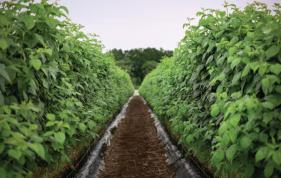
• Long-Term Investment: Best for inground systems yielding over multiple seasons.
Cons:
• Slower to Establish: Needs a full season (or more) to produce marketable fruit.
• Higher Early Labor Needs: Cane management, weed control, and pest pressure start immediately.
• Weather Sensitive: Establishment depends on early soil and weather.
Bare-root raspberries suit experienced growers building perennial systems with lower upfront cost.
Tray Plant Raspberries
Pros:
• Easier Planting: Simple transplanting and minimal root disturbance.
• Strong Early Growth: Well-developed roots speed establishment.
• Flexible Timing: More transplanting options, especially in tunnels or staggered fields.
Cons:
• Moderate Cost: Priced between bareroot and long cane.
• Needs Immediate Care: Tray plants need immediate water and nutrients; delays risk poor establishment.
Long Cane Raspberries
Pros:
• Fast to Fruit: Ready to produce within 90 days—ideal for quick returns.
• Uniform and Predictable: Consistent size and vigor aid harvest planning.
• Labor Savings: Less weeding, spraying, and pruning early on.
• Efficient Space Use: Densely planted in tunnels or substrate systems for high yield per square foot.
Cons:
• Higher Initial Cost: Reflects advanced development and production.
• Shorter Lifecycle: Suited for annual or biennial models, not long-term fields.
Long cane raspberries are best for growers needing quick turnaround, precise timing, or labor efficiency—especially in tunnels.
Each format has strengths depending on your goals, labor, and timeline. Bare-root supports long-term, cost-effective growth. Tray plants offer quicker establishment and flexibility. Long canes deliver fast fruit and uniformity.
Need help deciding? Our team is ready to match you with the best plant type for your farm.
Direct sunlight for at least 8 hours per day
18”–24” in the row for red and yellow raspberries, 20”–24” in the row for black raspberries, 8’–12’ between rows
Avoid planting raspberry plants in soils where previous crops have included strawberries, raspberries, potatoes, tomatoes, eggplants, or peppers.
Mulch lightly with weed-seed-free straw during establishment to help control weeds and retain soil moisture. Leaves, grass clippings, and wood bark are not recommended as they may become matted or too heavy, impeding the growth of new canes.
Floricane (summer-bearing) raspberry plants bear fruit one year after planting. Those second-year canes are pruned out after summer harvest.
Primocane (fall-bearing) raspberry plants bear some fruit in the first fall of the planting year and either summers or falls after that depending on how they are managed. Most fallbearers will produce the best crop if canes are cut down each year and only allowed to fruit in the fall.

*Price includes royalty or usage fee. Patent laws or license contracts prohibit propagation of the variety for resale or trade.
Very winter hardy and vigorous, Prelude is the earliest ripening summer red raspberry, with midJune yields in northern climates with berries that are round-conic, have cohesive drupelets, and have very good flavor. Also produces smaller fall crop.

An excellent pick for Northern regions, Nova is winter-hardy, but also adapts well to different climates and heat. With vigorous, upright canes, Nova bears firm, bright-red, medium-to-large berries that ripen gradually over a long harvest season.

Released in 1960, Boyne is an exceptionally winter-hardy, earlyseason variety. It consistently produces deep-red, medium-sized berries with a sweet, aromatic flavor, making it an excellent choice for freezing and jam-making. Boyne grows where other varieties suffer winter injury to their canes.

Minnesota’s Latham raspberry variety is renowned for its excellent winter hardiness and good fruit quality. Berries are medium to large, bright red, and rounded, although they may sometimes lack cohesion. Widely adaptable and well-suited for U-pick operations.

Released in 1961, Killarney is especially winter hardy. It is an early mid-season variety ripening about a week after Boyne. It has an attractive bright red color and a good raspberry aroma and flavor. The canes grow upright and are medium-sized and sturdy.

Encore is vigorous, sturdy, upright, nearly spineless, and has excellent winter hardiness. Berries are large with very cohesive drupelets and good raspberry flavor. A smart choice for extending the summer raspberry-picking season, reaching the high yields required by commercial growers.
Early Season

The earliest fruiting primocane, Polana is highly productive in the fall in more northern locations. Berries are medium/large, glossy in appearance, and cohesive with good flavor. Its vigorous short canes thrive with extra fertilizer in May/June. Great for bridging the gap between summer and fall.
U.S. Plant Patent #18,954 | Early Mid-Season

Highly recommended for early fruit. Highyielding and thornless, Joan J performs consistently well for growers of all sizes! Berries are deep red, large, firm, and easy to pick with great flavor. If used to produce a double crop, the summer crop will fruit similar to Nova (mid-season).
U.S. Plant Patent #46,031 | Early Mid-Season

Imara® is a primocane variety known for easy cultivation, high yields, and robust plant vigor, ensuring a bountiful harvest. Its bright red, lustrous fruit boasts good flavor and releases easily from the plant, streamlining harvesting.
Great for U-pick and fresh markets. Very productive primocane from Poland that ripens 7–10 days after Polana and with similar timing to Joan J. Vigorous plant grows more upright than other varieties. Berries are large, very firm, and flavorful, but do not darken as much as other varieties. Early Mid-Season


U.S. Plant Patent #19,512 (‘RAFZAQU’ variety) | Mid-Season Mid-Season

Great for organic growers, Himbo-Top® produces extremely large, firm, bright red fruit that does not darken. Flavorful, conicshaped berries are easy to pick, and the plant is extremely vigorous. Shows high tolerance to Phytophthora root rot disease. Watch water and plant density for best results.
Widely adapted and great for U-pick markets, Caroline provides growers with large berries that have a rich, full, intense flavor. Plant is very vigorous, productive, and has good tolerance for root rot. It does not tolerate high heat and drought. Be sure to utilize good irrigation practices.

Good for jam, freezing, and eating fresh, Heritage is an heirloom variety that has long been considered the standard for fallbearing production and quality. Heritage produces high yields of flavorful berries.
BR = available as bare-root plants
TP = available as tray plants
PP = available as plug plants
LC = available as long cane plants
Mid-Late Season

Cascade Gem is a mid-late season variety that produces very large, glossy berries with sweet flavor and excellent shelf life. Vigorous and high-yielding, its upright, spiny canes benefit from support. Good for fresh eating, preserving, and freezing.

A highly productive variety, Anne bears large fruit that has an excellent appearance and sweet flavor. It may also produce a summer crop on overwintered canes not damaged by winter injury. Recommended for U-pick and roadside/fresh market operations.
U.S. Plant Patent #24,811 | Mid-Season

Double Gold produces mediumsized, conic-shaped berries that are a deep blush, golden champagne color and have an excellent, sweet flavor. The plant grows vigorously, suckers freely, and shows tolerance to diseases. Can be grown as both a floricane and primocane producer.
Late Season

The most popular and sweetest purple raspberry variety. Very productive with tall, thorny canes and large, high-quality berries that are good for fresh eating, jams, and jellies. Can elude spring frost damage and be picked slightly immature as a firm red berry. Multiple insect resistances, including immunity to the raspberry aphid.
Shekinah Tahi*
U.S. Patent Pending | Mid-Season

Bristol is a high-producing early variety with an upright growth and cluster formation that makes its berries very easy to pick. It has medium-size, firm, glossy fruit with the best black raspberry flavor. Moderately hardy but very vigorous, Bristol shows tolerance to powdery mildew.

The first completely spineless black raspberry variety, Shekinah Tahi grows vigorously and more upright than typical spiny black raspberry cultivars and has a harvest season similar to Jewel Black. Produces large fruit, weighing up to 4.5g, with a deep black color.

Our most popular black raspberry variety, Jewel produces excellent yields and superb glossy black berries that are large and full rich flavor. Jewel is an excellent choice for use in jams and jellies and is recommended for U-pick and roadside/ fresh market operations thanks to its reliability.
U.S. Plant Patent #27,131 | Early Season

Black
Season

A great season extender, Mac Black has high yields of very good flavored, mediumsized berries. One of the hardier black raspberry varieties, Mac Black benefits from a trellis system. It also shows some resistance to anthracnose. Recommended for U-pick and roadside/fresh market operations.
Niwot is very productive with attractive, shiny fruit and a less intense raspberry flavor than Jewel. The plant is vigorous and requires trellising. Produces a fall crop as well as an excellent floricane crop if allowed to establish for 2–3 years. Ripens slightly earlier than Jewel.
U.S. Plant Patent #27,182
Early Season Primocane

An early-yielding variety with conical fruits of deep color and high quality, Mapema requires minimal support and is easy to harvest by managing lateral growth for an open crop structure. Fruits release easily.
U.S. Plant Patent #PP31,552
Early Season Primocane

Great for early production and extended harvests thanks to its capacity to flower and fruit in low-light conditions. Grows well in soil or substrate, benefiting from pinching for vigorous growth. Medium-to-large, conical red berries are very firm, robust, and easy to pick.
U.S. Plant Patent #PP31,550 Early Mid-Season Primocane

With its nearly thorn-free structure, harvesting is efficient, with fruits releasing easily when picked later in the day. Rafiki fruits boast a good shelf life, ideal for distant transport without quality loss. Proficient in double cropping. Can thrive in hot, tropical climates.
U.S. Plant Patent #23,914
Late Season Primocane

A top raspberry variety, prized for its high yield and fruit quality. Large, light-red fruits offer good flavor and long shelf life. Ideal for double cropping as it thrives in substrates. Guaranteed easy picking, with fruits maintaining their vibrant color and quality even when harvested later in the day.
U.S. Plant Patent #PP31,551 Late Season Primocane

A leader in autumn production, Sarafina features vigorous growth, sturdy branches, the ability to thrive in diverse climates, and resists yellow rust fungus. Berries are firm, conical-shaped, flavorful, and easy to pick. Ideal for double cropping. Requires minimal chill for sprouting.
Nourse Farms is pleased to offer you the opportunity to bring Advanced Berry Breeding raspberries to your growing program. To order these varieties, you must contact Nourse Farms directly at 1-877-NFBERRY (6323779) or info@noursefarms.com. To learn more about Advanced Berry Breeding, scan the QR code.

Anne, Boyne, Caroline, Encore, Heritage, Killarney, Latham, Nova, Polana, Polka, Prelude
* Patented varieties. Prices include royalties.
• Pricing for quantities over 1,000 are per thousand.
• Shipping is additional; rates: 16% for ground, 45% for 3-day, and 55% for 2-day.
• Plants shipped after 6/30/2026 are supplied at the customer’s own risk.
• WARRANTY: See our warranty on the order form (page 45).
• For reseller pricing, email reseller@noursefarms.com or call 413-665-2658 option 3.
• To qualify for Early Pay Discount, your plant order must be $1,000 or more (excluding shipping) and paid in full. Normal prices will apply for lesser orders.
• Discount applies to plant total only. Shipping cost based on total before discount. For raspberry long cane and plug plant pricing, please call 1-877-NFBERRY (632-3779) or email info@noursefarms.com.


Scan this QR code to get quick, actionable insights on managing Spotted Wing Drosophila (SWD)— a serious threat to berry crops. Our blog breaks down identification tips, monitoring strategies, and proven control methods to help protect your fruit and maximize yield. Don’t let SWD catch you off guard—stay ahead with expert guidance.
Meet Jeremy, a passionate grower here at Nourse Farms who is helping us shape the future of long cane bramble production. Discover how innovative techniques and quality plants help growers save labor and boost yields.
Scan the QR code to read Jeremy’s full story and learn why long cane brambles are gaining momentum in modern farming.



• FAX 413-665-7888
• (877) NFBERRY (632-3779)
• info@noursefarms.com
ORDER NOW: NourseFarms.com
Blackberries are vigorous growers—and with the right support system, they can become one of the most productive and profitable crops on your farm. A rotating arm trellis (RAT) is a proven system that helps growers improve yields, reduce labor, and protect fruit quality.
Here’s how it works: The trellis features movable arms that support blackberry canes in multiple positions throughout the season. In spring, canes are trained vertically to encourage strong growth and flowering. As fruit begins to ripen, the arms are gradually rotated downward, positioning fruit on one side of the row for easy, efficient harvesting. After harvest, the arms can be rotated to a horizontal position for winter, making it easier to apply row covers for frost protection.
This system works especially well for semierect thornless varieties, which can be hard to manage on traditional T-trellises. Rotating arm trellises improve airflow, light exposure, and spray coverage— helping reduce disease pressure and fruit sunburn. Growers report higher-quality fruit and better packout rates.

Pictured is Chester growing on a rotating trellis at Nourse Farms’ HQ in Whately, MA.
Grower tips: Start training from year one to establish a solid framework. Keep primocanes and floricanes separate for easier management. Avoid overcrowding by maintaining proper spacing and pruning regularly. And always position fruiting canes on the north-facing side during harvest to minimize sun damage.
For commercial growers looking to scale efficiently, rotating arm trellises are a smart, sustainable solution.
Long cane blackberry plants grown in substrate are designed to produce fruit fast, maximizing your yield and profitability. These advanced plants offer an efficient solution for commercial growers looking to reduce time to harvest and increase market flexibility. This year’s catalog includes long cane varieties. Look for varieties marked with LC for long cane plants.
If you’re a large commercial grower, we invite you to learn how Nourse Farms’ long cane blackberry plants can support your goals with faster production and healthier plants. Custom propagation services are available, tailored to your specific variety and schedule needs. Contact us at info@ noursefarms.com or 1-877-NFBERRY (632-3779) to explore how we can help grow your business.
SUNLIGHT
Direct sunlight for at least 8 hours per day
SOIL PH
6.5–6.8
SPACING
3’–4’ within the row 8’–12’ between rows
Avoid planting blackberry plants in soils where previous crops have included strawberries, raspberries, blackberries, potatoes, tomatoes, eggplants, or peppers.
Plant 1⁄2”–1” deeper than the soil level of the plant.
Mulch lightly with weed-free straw during establishment to help control weeds and the soil retain moisture. Mulching is necessary in zones 5 & 6 for winter protection.
Trellising blackberries is one of the most important cultural practices.
Floricane (summer-bearing) blackberry plants bear fruit one year after planting.
Second-year canes are pruned out after summer harvest.
Primocane (fall-bearing) blackberry plants bear some fruit the first fall of planting year, and either summers or falls after that depending on how they are managed.
Most fall-bearers will produce the best crop if canes are cut down each year and only allowed to fruit in the fall.

U.S. Plant Patent #20,891 | Early Season

The earliest ripening thornless variety, Natchez has very high production potential and very large, flavorful berries that can be harvested during a 3–5-week season. Performs best with a trellis due to its semi-erect growth habit. Great for fresh market operations. Bred by the University of Arkansas.

All
Highly recommended for MidAtlantic, West Coast, and Southern states. This thornless variety has excellent quality fruit with firm, sweet berries. The plant has very erect canes, intermediate vigor, and appears resistant to anthracnose, double blossom/ rosette, and orange rust.
U.S. Plant Patent #33,330 | Propagation prohibited by law | Early Mid-Season

One of the sweetest, most flavorful blackberry varieties with great post-harvest quality, a unique compact growth habit, and excellent cane health. Ponca ripens shortly after Natchez and before Caddo. Shows very limited injury to a low of 1ºF as well as a good secondary bud crop. Bred by the University of Arkansas.

Great choice for extending the season. Triple Crown is a semierect, thornless blackberry plant with large, flavorful fruit. It ripens in early to mid-August (in Whately, MA) and is considered a winter hardy blackberry plant. Bred by USDA-Beltsville and the Pacific West Agricultural Research Service.
U.S. Plant Patent #33,115 | Propagation prohibited by law | Early Mid-Season

An erect-growing blackberry variety intended for fresh market use, Caddo has an overall high fruit quality, excellent postharvest fruit-handling potential, consistently high yields, and excellent plant health. Ripens early mid-season with very large fruit. Bred by the University of Arkansas.

One of the more winter-hardy, productive, thornless varieties, Chester produces medium to large, high-quality, flavorful fruit that ripens in early to mid-August (in Whately, MA). Fruit retains its shiny black color in hot weather. Plants are vigorous and show resistance to cane blight.

An outstanding commercial primocane berry. Prime-Ark® 45 produces mediumsized primocane berries and larger floricane fruit that holds up well after picking. The thorny, erect-growing plant is very productive but may be too late for some northern areas if not in high tunnels.

A thornless, up-right grower, Prime-Ark® Freedom produces on its floricanes several days earlier than Natchez. Berries are not recommended for shipping, but are a great choice for local commercial distribution and fresh market operations due to its excellent fruit size and flavor. Bred by the University of Arkansas.
PP = available as plug plants
LC = available as long cane plants
* Patented varieties. Prices include royalties.
** 72’s cannot be ordered online. Please call or use the order form to purchase.
• Pricing for quantities over 1,000 are per thousand.
• Shipping is additional; rates: 16% for ground, 45% for 3-day, and 55% for 2-day.
• Plants shipped after 6/30/2026 are supplied at the customer’s own risk.
• WARRANTY: See our warranty on the order form (page 45).
• For reseller pricing, email reseller@noursefarms.com or call 413-665-2658 option 3.
• To qualify for Early Pay Discount, your plant order must be $1,000 or more (excluding shipping) and paid in full. Normal prices will apply for lesser orders.
• Discount applies to plant total only. Shipping cost based on total before discount. For blackberry long cane pricing, please call 1-877-NFBERRY (632-3779) or email info@noursefarms.com.
Direct sunlight for at least 8 hours per day
Required soil pH level: 4.5—4.8; the optimum pH value for growing blueberry plants is 4.5.
For best results amend pH levels the year prior to planting and apply garden sulfur regularly. (Note: excessive sulfur is toxic.)
3’–4’ within the row 8’–12’ between rows
Use untreated, uncolored wood chips (avoid Cedar or Black Walnut) for mulch or soil amendments. Do not use sawdust, leaves, or wood shavings.
When fertilizing in the spring:
• Do not use fertilizer that contains potassium chloride.
• Do not fertilize close to or at planting.
• Do not fertilize in late summer/early fall. It can cause new growth, which is susceptible to winter injury & disease.
Because of a very shallow, fibrous root system, frequent (up to 3x/week) watering is required. Drip irrigation beneath a layer of mulch is the healthiest and most efficient method.
Blueberry plants bear fruit one (1) year after planting. Pinch blossoms the first year.
Yellow leaves on blueberries can be quickly corrected with a foliar application of one tablespoon chelated iron per gallon of water sprayed over the leaves. You should see greener leaves in a few days. Often, the underlying problem is that the soil pH is too high. Have your soil tested and make required amendments.
You should see 12”–18” of new growth each year. If not, check your soil pH and/or use a little more fertilizer. Be sure your plants are receiving enough water, especially during dry spells.

A leading variety in the Mid-Atlantic and for mechanical harvest, Duke is an early-season, high-yielding, consistent variety that needs a quality growing site and regular care to ensure uniformsized, quality fruit. Berries are firm, large, and mild to slightly tart. Blooms late, ripens early, and grows upright to a height of four to six feet. Bred in 1987 by Fall Creek.

A small but mighty standout from Maine, Burgundy stands three feet wide by one to two feet tall. Its small, pea-sized berries are easy to pick and boast a classic wild taste. Shows bronzy-colored spring growth, gray-green summer leaves, and deep burgundy fall colors. Bred by Fall Creek.

An early-season, highly-adaptable, winter-hardy variety, Patriot excels in various soil conditions, outperforming other varieties in wetter soils. Consistently produces large, delicately sweet blueberries. Seasonal colors make for attractive containers and landscapes. Bred in 1976 by Fall Creek.
Early Mid-Season

A reliable early to mid-season variety, Draper produces firm, flavorful berries with excellent color retention and shelf life. Plants are compact and highly productive even when young, with a concentrated ripening window ideal for efficient harvest. Easy to hand-pick and suitable for machine harvest, Draper remains a top choice for both fresh market and freezing.

One of the fastest-growing, adaptable, high-yielding varieties, Reka offers vigorous growth, is tolerant to wetter ground, and thrives in various northern climates and soil types, including light sandy soils, peat, and heavier clay loams. Berries are medium-sized and rich-tasting. The plant grows four to six feet tall. Stunning red and burgundy fall foliage. Bred in 1989 by Fall Creek.
Mid-Season

Ideal for growers with limited space, Top Hat grows to a manageable one to two feet in height and width. Despite its compact size, this variety produces an impressive yield of pea-sized blueberries with a wild flavor. Bred by Fall Creek.
Mid-Season

An excellent winter-hardy variety. Growing two to three feet wide with snow-white blooms in spring and dense, glossy green foliage in summer, it’s a great choice for containers, borders, or group plantings. Bred by Fall Creek.
SEE PRICE LIST ON PAGE 34.
*Price includes royalty or usage fee. Patent laws or license contracts prohibit propagation of the variety for resale or trade.
Mid-Season

Known for its winter hardiness, Northland produces a consistent crop following temperatures as low as -30ºF. Its medium-sized berries are best for jams and baking. The plant grows compactly four to six feet tall, adding bright yellow wood and vibrant foliage to fall/winter landscapes. Bred by Fall Creek.
Mid-Season

Proven to grow quality fruit in cold climates, Northblue can survive winter temperatures of -35ºF. Northblue is a half-high blueberry with wild lowbush ancestry that produces wild-tasting juicy blueberries that are good fresh or baked. Bred by Fall Creek.

A leading commercial variety and the best all-around variety due to its adaptability, long production period, high yields of fruit, and disease resistance. Classic, sweet-tasting berries grow in large clusters and can be used fresh or frozen. Ideal for U-pick or roadside/fresh market operations. Plants grow four to six feet tall.

A popular U-pick known for its high yields and outstanding, sweet dessert flavor, Blueray performs in hot temperatures and is winterhardy. It does not tolerate high soil pH, so be advised to test your soil. The plant grows to four to six feet. Bred by Fall Creek.
U.S. Plant Patent #24,697 | Mid-Season

Known for its very large, flavorful, juicy fruit, Top Shelf excels in plant vigor, is easy to prune, and has high yields at a young stage. Great for U-pick and roadside/fresh market operations. Recommended for highchill regions with milder winters. Bred by Fall Creek.
Very
A top choice for U-pick operations. Highly productive with excellent large berries that are ideal for baking. Winter hardy and grows in a compact, globe shape four to six feet tall. Fall foliage and winter wood are golden yellow with bright-white spring blooms. Bred by Fall Creek. Mid-Season


With heavy yields of extremely large, robust-flavored berries, Chandler is an excellent late mid-season choice for U-pick and roadside/fresh market operations. Plants are vigorous with a spreading habit of five to seven feet. Ripening period can last up to six weeks. Bred by Fall Creek.

A high-yielding, easy-to-grow heirloom, Jersey is one of the oldest and most widely grown blueberry varieties. Berries are dark blue and medium in size, with a lush, sweet flavor. Plant grows to an average of six to eight feet and has excellent ornamental value.
With potential for berries through September, Elliott is an ideal season extender for U-pick and roadside/ fresh market operations. Berries are medium-sized, firm, light blue color, and can be quite tangy if not fully ripe. The plant is productive, very vigorous, and winter hardy. Bred by Fall Creek. Very Late Season

Very Late Season

Great for Mid-Central, southern Northeastern, and Mid-Atlantic states, Darrow produces excellent yields of quarter-size, juicy, memorably robust flavored berries. The plant is very vigorous and grows upright to approximately four to six feet. Not recommended for northern areas. Bred by Fall Creek.

A cold-hardy, late-season variety, Aurora is one of the latest ripening Highbush blueberries. Berries are medium-large— about 25% larger than Elliott—with a slightly darker color and rich, sweet flavor. Fruits resist cracking and shriveling, allowing for extended hang time and improved flavor development. Ideal for hand harvesting and fresh market sales.
Very Late Season

A vigorous, upright bush, Last Call produces high-yielding, large berries with a classic sweet and slightly aromatic blueberry flavor. Primarily recommended for commercial production but also great for extending the season for processed and local markets. Bred by Fall Creek.

Pictured are blueberries growing at Nourse Farms’ HQ in Whately, MA.
Aurora, Bluecrop, Bluegold, Blueray, Burgundy, Chandler, Darrow, Draper, Duke, Elliott, Jersey, Northblue, Northland, Northsky, Patriot, Reka, Top Hat
* Patented varieties. Prices include royalties.
• Pricing for quantities over 1,000 are per thousand.
• Shipping is additional; rates: 16% for ground, 45% for 3-day, and 55% for 2-day.
• Plants shipped after 6/30/2026 are supplied at the customer’s own risk.
• WARRANTY: See our warranty on the order form (page 45).
• For reseller pricing, email reseller@noursefarms.com or call 413-665-2658 option 3.
• To qualify for Early Pay Discount, your plant order must be $1,000 or more (excluding shipping) and paid in full. Normal prices will apply for lesser orders.
• Discount applies to plant total only. Shipping cost based on total before discount.
For blueberries, chill hours—the time between 32°F and 45°F—are essential for breaking dormancy and driving healthy bud, flower, and fruit development in spring.
Without enough chill, plants may leaf out late or unevenly, lowering yield, delaying harvest, and reducing fruit quality.
Chill needs vary by variety:
• High chill: 800–1,000 hours
• Low chill: 150–800 hours
All Nourse Farms blueberries are high chill, bred for regions where these requirements are consistently met year after year. Matching chill needs to your climate ensures vigorous growth, timely flowering, and a reliably productive harvest.
At Nourse Farms, we take the guesswork out of maintaining on-time inventory and offering high-demand plants your customers will love. Each year, we supply hundreds of nurseries, garden centers, greenhouses, farm stores, and other retailers across North America with premium plants that drive repeat business. If you have questions about reseller distribution of Nourse Farms plants, we’re here to help! Email us at resellers@noursefarms.com or call us at 1-877-NFBERRY (632-3779) option 3.
1. Virus-Indexed, Disease-Free Plants
Every plant is grown in controlled environments to meet the highest standards of health and vigor— ensuring consistent quality for your customers.
2. Wide Selection
From small fruit varieties to asparagus, we offer an extensive product line to help you meet diverse customer preferences and seasonal opportunities.
3. True-to-Type Genetics
Our plants are genetically verified, so you can sell with confidence knowing customers will receive exactly what they expect—every time.
4. Reliable, On-Time Delivery
Choose your preferred ship date and count on us to deliver as promised, keeping your shelves stocked and sales flowing.
5. 100% Guarantee
We stand behind every plant we ship—your satisfaction and your customers’ success are our priority.
6. Tailored to Your Business
We collaborate directly with each reseller on variety selection, delivery coordination, and promotional resources so you can grow your product offerings and your bottom line with confidence.
Small Fruit & Asparagus Plants – Everything You Need to Expand Your Spring Offerings
Thursday, November 20, 2025 | 12–12:45 p.m. EST | Join from Anywhere A content-rich, expert-led session designed to prepare you for a successful season.
You’ll gain valuable, in-depth insights into:
• The season’s top variety and product options
• Delivery choices and scheduling best practices
• Merchandising strategies to increase in-store and online sales
Free to attend and crafted specifically for resellers who want to plan with confidence and start the season strong. Stay tuned for registration at NourseFarms.com
Be the first to know about new varieties, seasonal availability, early access opportunities, and upcoming webinars by joining our Reseller Newsletter. Sign up at: NourseFarms.com/pages/newsletter
Nourse Farms offers gooseberry, currant, and elderberry plants— plants that produce “unusual” fruit that don’t commonly make it to the grocery store shelves. But why?
Transport Challenges
Our “unusual fruits” store best when refrigerated as quickly as possible after harvest. Their need for cool storage after harvesting makes commercial handling and transport more challenging. However, a shorter shelf life is no problem if you sell onsite or locally.
Historical Restrictions
In the early 1900s, ribes were banned in many U.S. states because they were hosts for the white pine blister rust fungus, significantly impacting white pine populations in North America. By the late 20th century, bans were largely lifted as research showed new disease management avenues. While the ban was lifted in some places, ribes have not had a massive resurgence in popularity. (Some local restrictions still apply, so please check with your local extension office for local regulations before planting ribes.)
Is There Opportunity?
In one word: YES. Don’t let the reasons grocery stores don’t often carry these “unusual” fruits deter you from growing them. There are so many reasons to add these unique fruits to your growing program.
Diversify Your Harvest

These “unusual” fruits help you stand out in a crowded market. Offering something different can attract curious customers and specialty buyers.
Extend Your Season
These crops have different ripening windows than strawberries or raspberries, helping you stretch your harvest season—and your income.
High Nutritional Value
Packed with antioxidants, vitamins, and health benefits, these fruits appeal to health-conscious consumers looking for functional, nutrient-dense foods.
Niche Market Demand
Local chefs, bakers, brewers, and jam makers are often on the lookout for unique fruits that aren’t available in supermarkets. You could become their go-to source!
Adaptable and Hardy
Ribes and elderberries are cold-hardy and relatively low maintenance once established—great choices, particularly for many Northeast growers.
SUNLIGHT
Direct sunlight for at least 8 hours per day
SOIL PH
6.0–6.8
SPACING
3’–6’ in row, 10’–12’ between rows
Raw elderberries can be toxic because they contain cyanide compounds. For safe consumption, elderberries MUST be heat-processed. When heatprocessed, the cyanide compounds will evaporate out of the berries. Cooked elderberries are safe to eat, and the elderberry blossoms are edible!
SUNLIGHT
Direct sunlight for at least 8 hours per day
SOIL PH
6.0–6.5
SPACING
3’–4’ in row, 6’–8’ between rows
RESTRICTIONS: The gooseberry varieties carried by Nourse Farms have been bred for tolerance to White Pine Blister Rust disease. Check with your local cooperative extension office or Department of Agriculture for any restrictions on growing Ribes in your area.
SUNLIGHT
Direct sunlight for at least 8 hours per day
SOIL PH
6.0–6.5
SPACING
3’–4’ in row, 6’–8’ between rows
RESTRICTIONS: The currant varieties carried by Nourse Farms have been bred for tolerance to White Pine Blister Rust disease. Check with your local cooperative extension office or Department of Agriculture for any restrictions on growing Ribes in your area.
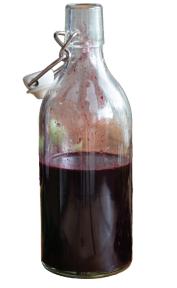
For growers looking to diversify their income streams, elderberries, gooseberries, and currants offer unique value-added potential. These lesserknown berries aren’t just a novelty— they’re packed with flavor, nutrition, and market appeal when transformed into specialty products.
Elderberries are a standout for their health benefits. Their high antioxidant content makes them ideal for wellness products like elderberry syrup, which continues to grow in popularity for immune support. Syrups, tinctures, and even elderberry gummies can command premium prices at farmers markets, health food stores, and online. Long-time Nourse Farms customer David Graves of Berkshire Berries knows a thing or two about adding these unusual fruits to his growing program for value-added potential. He and his daughter Heather plan to add an elderberry product to their line in the future. “You never know what you’ll learn from your customers until you start asking them,” Graves says. “That’s how I learned that there’s a demand for elderberry!”
Gooseberries, with their tart, complex flavor, are well-suited for preserves. Gooseberry jam and pie filling are especially popular among consumers. The distinctive taste and vibrant color can also add a gourmet flair to baked goods, sauces, or compotes.
Currants shine in jellies and sauces. Red currant jelly, with its bright, tangy flavor, pairs well with cheese and meats, making it a staple for holiday charcuterie boards. White currants—a sweeter, more delicate currant—offer a subtle, honeyed flavor that works beautifully in jellies and dessert sauces. Their translucent berries also lend themselves to visually stunning preserves, syrups, and even wine or cordial applications. Currant products can stand out in farmers markets and specialty food shops.
Community-owned grocery store and Nourse Farms customer Quabbin Harvest is helping to spark consumer awareness about currants and gooseberries by creating and incorporating unique ribes recipes (such as tasty red currant scones and delicious lavender gooseberry lemonade) on social media and at their store.
By turning these small fruits into shelf-stable products, growers can extend their selling season, and tap into consumer demand for local, small-batch goods. With creative marketing and thoughtful branding, these “unusual” berries can become a profitable niche for farms of any size.

Samdal plants are vigorous, producing long shoots from the soil level in their first year, which will bear fruit the following year. Like summer raspberries, these are removed after bearing and replaced by the current year’s growth, making the bush easy to prune and manage. Large fruit clusters ripen in August each year. Berries have very high anthocyanin content and have medicinal qualities. Samdal is the more productive variety, but both varieties are required for crosspollination in a 1 Samyl : 5 Samdal ratio. Zones 3–7
Important message about elderberry consumption: Raw elderberries can be toxic because they contain cyanide compounds. For safe consumption, elderberries MUST be heat-processed. When heatprocessed, the cyanide compounds will evaporate out of the berries. Cooked elderberries are safe to eat, and the elderberry blossoms are edible.

This is the tastiest currant on the market for fresh eating! Pink Champagne is a vigorous upright bush, free of leaf diseases, with beautiful translucent pink fruit. Pink Champagne is easy to grow and produces fruit of high quality and good flavor. Zones 3–7

Samyl has exceptionally highquality flowers and is easy to prune and manage. Samyl provides good cross-pollination when paired with Samdal at a 1 Samyl : 5 Samdal ratio. Zones 3–7
*Price includes royalty or usage fee. Patent laws or license contracts prohibit propagation of the variety for resale or trade.

A red currant from Holland, Jonkheer van Tets is highly rated for its excellent flavor and fruit size. This early variety outperforms others but can be vulnerable to late frosts. In Massachusetts, it matures in early July. Special pruning may be needed. The erect, mildewresistant bush is easy to pick. Zones 3–7

Blanka is a white currant that produces heavy, off-white fruit on long strigs. The tart immature fruit turns sweeter when ripe. It is easy to grow and has vigorous plant health. Blanka is ideal for winemaking, juice, and fresh consumption. Zones 3–7

With its dependable nature elevating it to the #1 red currant around the world, Rovada produces very large fruit on extremely long strigs. This combination produces a heavy crop that is easy to pick. The plant is free of mildew and other leaf diseases. Its late flowering escapes frost. Zones 3–7
® * Canadian Plant Breeders Rights Certification #3348 (Variety – Rafzicta)

A Finnish variety, Hinnomaki is renowned for its superb flavor, high yields, and striking red fruit. Its outer skin has a tangy taste, while the flesh is delightfully sweet. Plants grow upright, are mildew-resistant, exceptionally productive, and are adaptable to various growing systems, including hedge or ornamental uses. Berries are sweet and perfect for eating fresh or baking in pies. Zones 3–7


Invicta has the highest yields of large, exceptional-quality fruit of any gooseberry variety, and is resistant to mildew and late spring frosts. The bush is vigorous and spreading. We recommend trellising this variety due to its spines. Regular dormant season pruning will encourage the optimal production. Zones 3–7
Tixia® produces large, beautiful, bright-red fruit similar in size to Invicta. In addition to its attractive fruit that ripens mid-to-late season, it is distinguished by its semi-thornless shoots and upright growth habit. Its growth is medium to strong. Zones 3–7
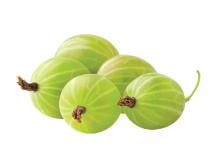
* Patented varieties. Prices include royalties.
• Pricing for quantities over 1,000 are per thousand.
• Shipping is additional; rates: 16% for ground, 45% for 3-day, and 55% for 2-day.
• Plants shipped after 6/30/2026 are supplied at the customer’s own risk.
• WARRANTY: See our warranty on the order form (page 45).
• For reseller pricing, email reseller@noursefarms.com or call 413-665-2658 option 3.
• To qualify for Early Pay Discount, your plant order must be $1,000 or more (excluding shipping) and paid in full. Normal prices will apply for lesser orders.
• Discount applies to plant total only. Shipping cost based on total before discount.
At Nourse Farms, we’re proud to offer a wide selection of high-quality berry plants—but our offerings don’t stop there. We also grow reliable, time-tested crops such as asparagus, rhubarb, and horseradish. These perennials not only provide long-term harvests, but they also make excellent companion plants—crops that can grow alongside one another to support better overall health and productivity in the garden or field.
Companion planting is a method that leverages the natural relationships between plants. Certain combinations— like strawberries and asparagus— have complementary needs and growth patterns. Both thrive in well-drained, fertile soil and benefit from regular irrigation, making them easy to care for side by side. Their harvest windows don’t overlap much either: asparagus is typically harvested early in the season, while strawberries begin producing shortly after, allowing you to make the most of your space and time.
Rhubarb and horseradish also bring benefits. Rhubarb’s large leaves help shade the soil, conserving moisture and suppressing weeds naturally. Horseradish is known for its pest-repelling properties and is often planted near crops to help deter harmful insects. These plants can contribute to a more balanced and biodiverse planting system, reducing your reliance on synthetic inputs.
Companion planting promotes better soil health, attracts pollinators, and can even enhance flavor and yield. For growers, adding companion crops is a practical way to maximize productivity and long-term success.
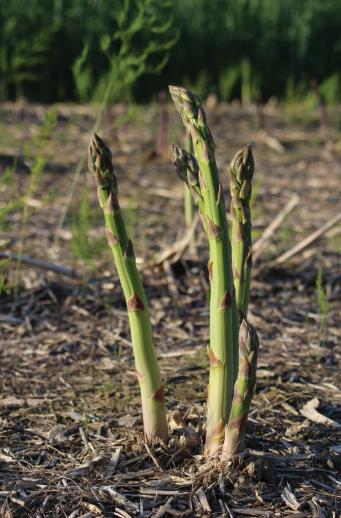
This approach also helps extend your harvest season and diversify what you bring to market. By planting crops that complement each other and stagger their peak times, you can minimize downtime between harvests and experience more consistent production throughout the season. It’s also an excellent strategy for small-scale growers who want to make the most of limited space.
At Nourse Farms, we’ve selected companion plants that are hardy, productive, and proven performers. When you order from us, you can trust that you’re getting vigorous plants that will work well together, season after season. Whether you’re looking to expand your growing area or maximize the space you have, companion planting is a smart, sustainable approach worth considering.
SUNLIGHT
Direct sunlight for at least 8 hours per day
SOIL PH
7.2 or higher
SPACING
12”–14” in the row for green varieties, 6”–8” in the row for purple varieties, 5’ between rows for green or purple varieties
VERY IMPORTANT: Use soil tests to check and maintain soil pH and phosphorous levels.
SUNLIGHT
Direct sunlight for at least 8 hours per day
SOIL
6.0–6.8
SPACING
3’ in row, 5’–6’ between rows
WARNING: The only edible portion of rhubarb is its stalks. Do not eat the leaves—they are poisonous. Remove at harvest and discard.
SUNLIGHT
Direct sunlight for at least 8 hours per day
SOIL PH
6.2–6.7
SPACING
10”–12” in row, 3’ between row

Looking to diversify and add value? Asparagus, rhubarb, and horseradish are powerful crops to consider.
These crops are in steady demand from restaurants, breweries, bakeries, and specialty food makers seeking fresh, seasonal ingredients with bold flavor. Asparagus is one of the first crops of spring, valued by chefs for its freshness and versatility. Rhubarb adds tart flavor to baked goods, preserves, and craft beverages, while horseradish brings a spicy kick to sauces, pickles, and condiments.
As perennials, they come back year after year, offering reliable yields with lower input costs. Once established, they require less labor than annual crops, making them a wise long-term investment.
They also broaden your customer base. Whether you’re supplying a brewery, selling at a farmstand, or building CSA boxes, these crops offer something unique that sets your farm apart. Their harvest windows often fall outside peak berry season, extending your production and sales timeline.

Millennium has established itself as a top-performing variety, adaptable to a range of soils, including heavier soils. Millennium has proven to be very productive with high-quality, consistently large spears. Spears maintain tip tightness as they grow and are tender with good flavor. Millennium is rust tolerant. Bred by the breeding program of Guelph, Ontario, Canada. Zones 3–8

Mary Washington is an easy-togrow heirloom variety with excellent flavor and quality. This vigorous, rust-resistant, winter-hardy variety produces large, rich green stalks. Perfect for local market growers. Zones 3–8
Disease Resistant
Very Winter

Purple Passion is a unique asparagus variety especially suited to the asparagus enthusiast. Its special, attractive purple color, flavor, and tenderness distinguish it from others. In addition, Purple Passion has productive yields. For best performance, we recommend plant spacing for Purple Passion is 6–8 inches apart in the row instead of the usual 12-inch spacing. When cooked, the bright purple color is reduced, but when served fresh in salads it provides a colorful and flavorful accent. Purple Passion is an excellent addition to any asparagus planting. Zones 3–8

Pictured: Millennium roots arrive just like this—ready for planting.

Nourse Farms selected MacDonald Strain rhubarb for its excellent production. This very vigorous, upright-growing strain produces large, tender stalks and has an acceptable red color. Shows resistance to root-rot problems. Zones 4–7

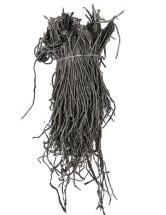
Although Cawood Delight isn’t as vigorous as MacDonald, it stands out with its deeper red color and slightly thicker stalks, making it an attractive and marketable option. Its stout growth habit thrives in northern regions, though it may struggle in areas with prolonged periods of high heat. We’ve received a lot of positive feedback from our commercial grower customers about this variety. Zones 4–7
SEE PRICE LIST BELOW (page 43).
*Price includes royalty or usage fee. Patent laws or license contracts prohibit propagation of the variety for resale or trade.
Horseradish, known for its bold flavor, keeps that punch for months when stored properly. After digging (usually in late fall), gently brush off soil but skip washing the roots—too much moisture can cause rot. Trim tops to about an inch and set aside only firm, healthy roots.
Store roots in a cold, humid environment, in perforated plastic bags or crates filled with slightly damp sand or

We offer the strain Big Top for its size, vigor, and wide adaptability. An added plus is resistance to foliage diseases, rust, and bacterial spot—all common horseradish problems. These plants are top performers. A few roots will last a lifetime! Zones 3–8
sawdust. Ideal conditions are 32–38°F with high humidity, similar to a root cellar or walk-in cooler. Kept this way, horseradish stays fresh for up to six to eight months.
Keep it away from ethylene-producing fruits such as apples, which can shorten the shelf life. With the proper care, you’ll have quality horseradish ready for processing, sale, or replanting well after harvest.
* Patented varieties. Prices include royalties.
• Pricing for quantities over 1,000 are per thousand.
• Plants shipped after 6/30/2026 are supplied at the customer’s own risk.
• WARRANTY: See our warranty on the order form insert.
• For reseller pricing, email reseller@noursefarms.com or call 413-665-2658 option 3.
• To qualify for Early Pay Discount, your plant order must be $1,000 or more (excluding shipping) and paid in full. Normal prices will apply for lesser orders.
• Discount applies to plant total only. Shipping cost based on total before discount.
Bare-rootStrawberryPlants500(case)1,000(case)25K+50K+100K+200K+ JuneBearer
Allstar,Earliglow,Honeoye,Jewel,Annapolis, Flavorfest,Sparkle,Cavendish,Darselect
Brunswick,Cabot,Galletta*,Dickens*, ACValleySunset*,ACWendy*
Malwina*,Sonata*,Yambu*$180$290$280$260$250$230 Everbearing(Day-Neutral)
Seascape,Albion*$190$310$290$280$260$250 Evie-2*,SanAndreas*$200$320$310$290$280$260 MaradesBois$230$370$350$340$320$300
Red&YellowRaspberries100(case)5001,0005K+10K+25K+50K+ Anne,Boyne,Caroline,Encore,Heritage,Killarney, Latham,Nova,Polana,Polka,Prelude
$386$1,690$1,930$1,840$1,740$1,640$1,550 Himbo-Top®*,Imara®*,JoanJ*,DoubleGold*$470$2,055$2,350$2,230$2,120$2,000$1,880
Chandler,Darrow,Draper,Duke,Elliott,Jersey, Northblue,Northland,Northsky,Patriot,Reka, TopHat
41 River Road, South Deerfield, MA 01373
P: 413-665-2658 or 1-877-NFBERRY (632-3779) F: 413-665-7888
info@noursefarms.com | NourseFarms.com
How to Order BY MAIL: Nourse Farms ATTN: Catalog Orders 41 River Road South Deerfield, MA 01373
Please Fill Out the Below Information
Customer Information
Billing Address
Must match the address on your credit card statement.
For Nourse Farms Use Only ONLINE: NourseFarms.com BY PHONE: 413-665-2658 or 1-877-NFBERRY (632-3779) BY FAX: 413-665-7888
Email & Phone
What best describes you?
Shipping Address
Street addresses only. We do NOT ship to P.O. Boxes.
RESELLER
WARRANTY: NOURSE FARMS WARRANTS that the products it sells have been labeled as required by law and that they conform to the label descriptions. NOURSE FARMS MAKES NO OTHER WARRANTIES, EXPRESS OR IMPLIED, OF MERCHANTABILITY, FITNESS FOR PURPOSE OR OTHERWISE. THE EXCLUSIVE REMEDY FOR LOSS OR DAMAGES DUE TO BREACH OF THE FOREGOING WARRANTY OR CONTRACT OR FOR NEGLIGENCE OR OTHER CAUSE SHALL BE LIMITED, AT THE OPTION OF NOURSE FARMS TO THE REPLACEMENT OF SUCH PRODUCT OR REFUND OF THE PURCHASE PRICE OF SUCH PRODUCT, AND NOURSE FARMS SHALL IN NO EVENT BE LIABLE FOR ANY OTHER DAMAGES, WHETHER DIRECT, INDIRECT, INCIDENTAL, SPECIAL OR CONSEQUENTIAL. By acceptance of the product, the buyer acknowledges that the limitations and disclaimers herein described are conditions of sale and that they constitute the entire agreement between parties regarding warranty or any other liability.


Important Notes
• California, Oregon, Washington, and Hawaii plant orders and Michigan blueberry plant orders require a $15 fee for phytosanitary inspection. (Requires at least one week’s notice.)
• If varieties are not available, we will substitute plants of equal or greater value. Check here if you do not want a substitute.
• Varieties cannot be combined for quantity pricing.
Order Form
An informative Planting & Success Guide will be shipped free of charge with every order
Method of Payment
Check or money order Visa Discover MasterCard
Credit card number Expires Security
Signature Date
Fulfillment Method SHIPPING TOTAL
Request 10 business days’ notice before picking up or shipping an order with an open date.

As our operations are increasingly busy, we are no longer open to walk-in visitors or in-person ordering. Thank you for your cooperation. PICK UP ON (WEEK) SHIP (Federal Express is our partner in shipping.) Scan the QR code to place your order now!
Shipping & Handling Charges
We require 10 business days’ notice of changes to ship date.
3-day recommended for west of the Mississippi River after May 15. Shipping charges are not reimbursed with replacement orders.
NOTE: Asparagus crown orders over $200 may have shipping charges that exceed 16%. Call for quote: 413-665-2658
Order by Phone: (413) 665-2658 or 1-877-NFBERRY (632-3779)
Order by Fax:
Fill out the attached order form and fax to: (413) 665-7888
Order by Mail:
Fill out order form and mail to:
Nourse Farms, 41 River Road South Deerfield, MA 01373
NOTE: Order changes must be given to us 10 business days prior to shipping.
For GPS, tracking, and deliveries, our physical address is 41 River Road, Whately, MA 01093.
Order now to ensure your first choices! Prices valid to May 31, 2026. Use the enclosed order form, call us or order online. We do not recommend fall planting. We make every effort to ship on time.
Plants identified by a * cannot be propagated without permission. Royalty or usage fees are included in prices with the exception of ABB varieties (page 24). Patented varieties are protected by U.S. patent laws and licensed varieties are produced under contract with plant breeders.
are additional. Shipping by Ground Service unless otherwise specified. Federal Express is our partner in shipping. Ten (10) business days’ notice is required for orders with “open” ship dates. We’ll make every effort to accommodate shipping on short notice. For shipments made through the USPS and UPS, shipping charges will be calculated based on the order’s size and weight, and an additional handling fee will apply. Please inquire for details.
shipment. Additional testing and lab fees may apply. Call for case by case specifics.
Email resellers@noursefarms.com to get our reseller price list or call 413-665-2658 option 3.
• Orders $1,000 or less must be paid in full within 10 days of placing the order or will be subject to cancellation.
• Orders exceeding $1,000 require a 50% deposit within 10 days of placing the order or are subject to cancellation. Balance must be paid in full prior to shipment. For pickups, a customer may pay the balance at time of pickup by check only.
• Pick-up orders requiring a pallet incur a $20 fee. LTL and Truck shipments have a $50 charge.
• Net 30 Terms may be extended for orders greater than $1,000 for returning customers only; determined on per customer basis, based upon a Customer Credit Application & prior payment history with Nourse Farms.
We do not accept/take orders at our office. These directions are provided for customers picking up orders.
Going South (from Greenfield and Vermont): I-91 South to Exit 35 (old exit 24) (marked Whately). At end of ramp, turn left, cross over I-91. Take first right onto Route 116 South. Turn right at first traffic light onto Sugarloaf Extension. Follow to end. Take right onto River Road. Nourse Farms is 3 miles south on right.
Going North (from Connecticut, Springfield and Northampton): I-91 North to Exit 30 (old exit 22) (marked Whately/North Hatfield). Off ramp, continue north on Route 5 & 10. Take 3rd right onto Depot Road. Follow 2 miles to stop sign. Turn left; we are 1 mile on left.
Going East or West (Mass Turnpike (I-90) or Route 2): Take Mass Turnpike to Exit 45 (old exit 4). After toll booth, follow to I-91 North and follow above. From Route 2, follow signs to I-91 South and follow above.
ALL plant orders to CA, OR, WA, and HI require a phytosanitary certificate ($15). MI blueberry plant orders also require a phyto.
Ship 2nd-day air only. No exceptions. Please call to coordinate shipment.
Shipped on a Monday or Tuesday. On warm days, shipping is by 3-day service to assure good condition. Added shipping charges are billed.
There is a minimum order total, and shipping is by special arrangement only. Nourse must receive payment in full in U.S. funds prior to shipment. Additional fees may apply. Add $50 for export certification by U.S. Dept. of Agriculture. Payment by credit card or bank transfer minimizes your bank fees. We accept U.S. Dollars only.
(Except to Canada) There is a minimum order total, import permit is required, and $150 for phytosanitary certificate. Import permits must be supplied at least 90 days in advance of shipment. To ensure we can meet all requirements, make your government request one year prior to
• Orders shipping after June 1 must be paid in full by June 1 to reserve the plants, or the order will be subject to cancellation and loss of deposit. Orders shipping after June 1 are not eligible for refund if canceled.
• Service charges of 1.5% per month are added to past due balances.
• We do not refund amounts less than $5.
• We accept Visa, Master Card, Discover, checks, and money orders.
For orders exceeding $1,000, we offer a 5% discount if paid in full by December 1, and a 3% discount if paid in full by December 31. Discounts apply to plant portion of order only and do not apply to shipping costs. Shipping costs are calculated prior to applying discounts.
For regional planting guidance, contact your local extension office. Find a complete USDA listing online at: www. nifa.usda.gov/extension
Or write to request information:
U.S. Department of Agriculture Cooperative State Research, Education, and Extension Service 1400 Independence Avenue SW, Stop 2201, Washington, DC 20250-2201
Grab your lunch and join us for expert insights—all in under an hour!
Live Webinar Series | 12–12:45 p.m. EST
No cost. Big value. Practical strategies from the berry experts at Nourse Farms.
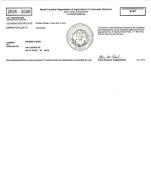
Thursday, December 4, 2025
Topic: Strawberry and Bramble Varieties and Planting Strategies
Kick off the season with the right plants and planting for success.
Thursday, January 22, 2026
Topic: Strawberry and Bramble Cultivation Types
Explore production systems and methods to fit your operation’s goals.
Thursday, February 19, 2026
Topic: Strawberry and Bramble Cultural Practices
Implement the field management techniques that keep berry crops thriving.
Free to attend | Expert-led | Join from anywhere
Stay tuned for registration details at NourseFarms.com
At Nourse Farms, we take pride in delivering your plants in great condition and on time. Our team will work with you to find the best shipping method and timing for your order. Options may include:
• Common Carrier LTL: Palletized shipments (15+ boxes) kept cool and protected.
• Pooled/Refrigerated Trucks: Occasional multi-drop service to the Midwest and Mid-Atlantic.
• Ground Service: 1-, 2-, or 3-day (regular or guaranteed); some areas may take up to a week.
